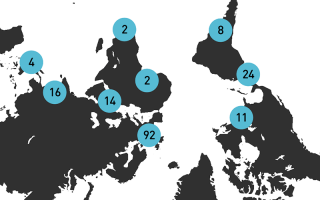Simon recounts experiences of studying MSc Urban Economic Development at the Development Planning Unit
Take a look at any list of megatrends and it's highly likely that you will see urbanisation as ranking among the key issues that will have a significant impact on development over the next century. Furthermore in the wake of the recent global financial crisis, economics is one of the most critically discussed topics in both mainstream media and academia.
It is for this reason, with both urbanisation and economics at the top of the development agenda that I chose to study Urban Economic Development (UED). The course embodies both of these important subjects and provides a medium/channel for inquisitive minds to engage with a topic, namely the economics of cities, that will define the shape of our society for years to come.
One of the things that particularly attracted me to the Development Planning Unit was that many of its courses offer a more practical learning experience, something that you don’t always find in similar masters programmes at other universities.
Through the UED course for example we worked with the Greater London Authority to tackle some of London's most pressing issues such as housing, employment and health. This was a great opportunity to get some 'hands on' and real consultancy experience in economic development. In my case I worked on a project looking at the economic impact of the 2012 Olympics on ethnic business communities in East London.
What also appealed to me the most about UED is that it gives you exposure to the economic development challenges in both developed and developing cities. This enables you to contrast the differences and similarities between cities at different stages of development.
Through the London-based fieldwork you are given the opportunity to undertake research into the key issues impacting the development of a Global City. Meanwhile the overseas fieldwork presents some similar but also vastly different issues when dealing with the challenges of delivering economic and employment growth in a comparatively less developed city.
Since graduating from the course I have been working at one of the UK’s leading planning and economics consultancies, Nathaniel Lichfield & Partners. In my role as an Economic Research Consultant, I regularly make use of what I learnt during my time studying UED.
The course helped prepare me to tackle some of the duties of my role including carrying out economic appraisals of proposed developments, identifying the opportunity for new Garden Cities and presenting to local government officials and developers about the growth prospects for various cities.
One of the high profile projects that I am currently working on is a review of recent Government initiatives aiming to support economic development such as a new generation of Enterprise Zones, City Deals and the Regional Growth Fund. Through the project I have had the opportunity to liaise with senior managers in the development industry and Central Government on the key issues for supporting local economic growth.
If I had to sum up in just three points why I think someone should study UED they would be:
1 - UED provides you with a solid grasp of the key issues of urbanisation and economic development. It also gives you detailed knowledge and practice of working on projects related to managing the city economy.
2 - The practical experience gained from working on consultancy projects in both developed and developing cities is extremely beneficial for applying the theoretical components of the course to real world situations and challenges. This type of experience is also highly valued by prospective employers and provides some great anecdotes for interviews.
3 - The opportunity to study in a stimulating and engaging environment with an internationally diverse group of peers, working together to find solutions to the key challenges for urban economic development.
While the course (like any master’s programme) is no doubt hard work and at times the assignments can seem daunting, it is the positive attitude of your fellow classmates and professors who are equally as passionate about the subject as you are that ultimately makes studying Urban Economic Development both a rewarding and valuable experience. I can highly recommend the course to anyone that has an interest and desire to work in areas related to cities and economic development.
PWC’s Megatrends and KPMG’s Future State 2030: The global megatrends shaping governments are just two examples of many reports identifying ‘Urbanisation’ as a key megatrend for the next centuryhttp://www.pwc.com/gx/en/annual-review/megatrends/index.jhtml
Linkedin - https://www.linkedin.com/in/simon-chinn-82091617/
 Close
Close


